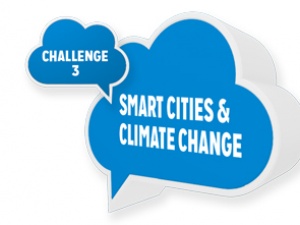You are here
Add new comment
ITU Telecom World 2014: Young Innovators Competition
Submitted by solomonopio on 22 August 2014 - 4:55pm
The ITU Telecom World Young Innovators Competition in partnership with the World Health Organization (WHO) is looking for innovative ideas on how information and communication technologies (ICTs) can help smart cities to slow down or mitigate the effects of climate change. This might include novel technologies or combinations of existing technologies, services, and systems which would shape a smart city. It may focus on monitoring of or reporting on climate change, mitigating or adapting the impact of climate change on society, or on changes in technology and society that lead to a greener community.
Smart cities are one of the cornerstones of urban planning and technology today. A city is considered to be “smart” when investment in human and social capital in the form of education and civil society, transportation and communications infrastructure, wise management of natural resources and participatory governance, fuel sustainable economic growth and high quality of life.
Through a focus on reducing emissions, improving environmental sustainability, and innovations in green technologies, smart cities can lead the way in reducing human impact on climate change. Improvements in public services and the availability and use of ICTs make it possible for smart cities to reduce the negative effects on citizens’ health and wellbeing created by air pollution and global warming such as extreme weather events, spread of epidemic and endemic diseases and food insecurity. Those already living in especially vulnerable areas, such as small islands states, developing communities or the areas around large cities, are especially well-placed to gain from the benefits of smart cities.
Socially conscious innovators and entrepreneurs have a crucial role to play in these changes. By working with transportation and public spaces, health infrastructure and public health efforts, education, civic engagement, ICTs and green technologies, entrepreneurs can help to create innovative solutions that better educate, empower and connect citizens to transform their cities. Some of these innovations take the form of physical devices, such as smart grids and infrastructure; some are software, such as big data analytics, or services and processes, such as education or community building programmes. These innovations form the core of many aspects of smart cities.
For this challenge, ITU Telecom World Young Innovators Competition calls on young people around the world to work together on concepts for new and innovative social startups using the various elements of smart cities to help the communities of the future to adapt to, or reduce the severity of, climate change. The best initial ideas will be presented at the WHO Conference on Health and Climate Change on August 27 - 29. At the end of the competition, two winners will join ITU Telecom World 2014 in Doha, Qatar, from December 7-10 to pitch their ideas in front of industry leaders and national governments, participate in workshops, benefit from a year of ongoing mentorship, and win up to $5 000 in seed funding.


